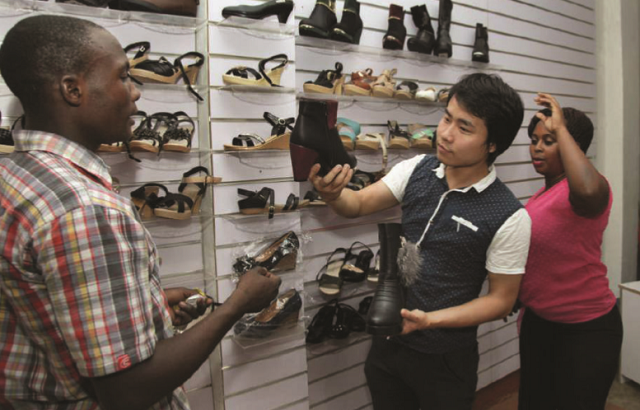
Why tension is growing over Indian, Chinese retail traders
On Nov.18, traders in the northern Uganda town of Lira refused to open their shops for business in protest against what they termed as `unfair competition’ from foreign traders; mainly Indians. The protest by traders under the Lira Business Community (LBC) went on despite the intervention of the Minister of Trade and Industry, Amelia Kyambadde, who travelled there from Kampala in a bid to avert it.
The situation remained tense the whole day as Kyambadde met with the leaders of the traders, area MPs, and other public administration officials.
In the run-up to the close-down, Godwin Achai, the chairperson LBC told Journalists that Lira Indian traders were pushing local traders out of the lucrative produce business. This includes trade in locally produced agricultural products like sim-sim, groundnuts, sunflowers, sorghum, and millet. He said the traders want the Indians “chased” out of town.
“We are suffering at the hands of these so-called Indian investors,” Ochai reportedly said, “They have chased all local produce dealers.”
Tension between local and foreign traders has been brewing for a long time in Lira.
Earlier in October, Indian traders had failed to open their shops in fear of attacks from locals. Business resumed following intervention by local civic leaders and area MPs. It is not clear how long the tension can be kept in check, especially following outbursts by the Minster of Trade, Amelia Kyambadde, that appear to support local opposition against foreign traders.
Petty traders not tolerated
Kyambadde on Nov.17 told Journalists in Kampala that the influx of foreign traders in retail and wholesale trade, and hawking will not be tolerated as it contravenes the country’s trade laws. It is not clear which laws Kyambadde was referring to because she did not cite any trade laws.
She mainly dwelt on the foreigners who appear to have undercut locals out of trade right from manufacturing, to transportation, distribution and retail.
“Some foreign traders are slowly but steadily monopolising the entire distribution chains,” she said,” she said adding that some are unlicensed.
Kyambadde said the government plans to review laws, regulations and policies to address the existing loopholes affecting domestic trade and to strengthen the Immigration Directorate’s monitoring of foreign migrants. In 2012, the government did a validation exercise in which majority of the foreign traders in the country were found lacking the requirement documents.
Some of the interventions offered by the Minister have attracted critical comments from experts and members of the public.
Among these is a proposal to give Kampala City Traders Association (KACITA) power to validate documents of all foreign traders. The Kampala traders are generally against foreign traders and are likely to treat them unfairly.
Everest Kayondo, the chairman of KACITA has said publicly that foreigners involved in petty business “should be deported back into their home countries”. He says foreigners should only engage in manufacturing and the service sectors.
Kayondo’s view is in contradiction of the “Guidelines by the Ministry for Issuance of Clearance Certificates for Foreigners to Trade in Uganda” issued by the Ministry of Trade, Industry, and Cooperatives in 2015. Under the guidelines, foreigners are legally free to engage in trade of any kind as long as they fulfill licensing requirements under the Trade Licensing Act Cap 101. These include incorporating a company, depositing US$100,000 in Bank of Uganda, getting an entry permit from Immigration, getting a traders license from a local authority.
It is not clear how many of the Indian traders under attack have not complied with these requirements. In 2012, the government did a validation exercise in which majority of the foreign traders in the country were found lacking the requirement documents. The alleged illegal traders were never deported and some of them were shielded by local traders, according to the Ministry of Trade.
It is also not clear how much of the rivalry is not a result of foreigners attracting more customers because of better business practices, including better pricing.
This time, Kyambadde says local authorities delegated by her ministry to issue trading licences must ensure that prospective foreign investors present the right documents from relevant government agencies like Uganda Investment Authority, Immigration, Uganda Registration Services Bureau, and Bank of Uganda or else not be licensed.
 The Independent Uganda: You get the Truth we Pay the Price
The Independent Uganda: You get the Truth we Pay the Price



